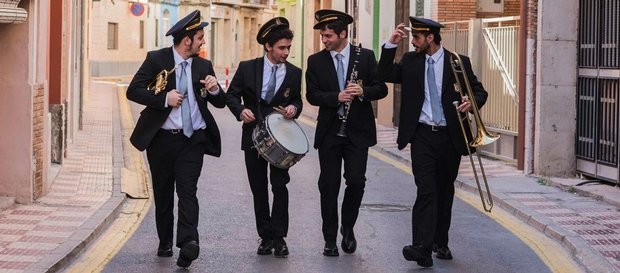A likeable set of performances redeems Love Beats, Roberto Bueso’s film about a talented young musician, Edu, who returns from a year abroad to his family home, reconciling himself with the elements of his boyhood which have so obviously forged his selfhood. Edu’s a lovely presence, and Gonzalo Fernandez’s performance emphasises the kind-natured shyness of the character; he’s handsome but repressed, possessing a sweet temperament without necessarily being gregarious. It’s easy to see why everyone greets him so nicely.
At the airport, his doting parents tearfully embrace him; his closest friend, Juanma (Pepo Llopis), is clearly overjoyed to be by his side again; his other, less dependable friends Fari and Bighead reactivate their badinage within seconds of being near him; his neighbour and Juanma’s partner, Alicia (Charlotte Vega), with whom he’s clearly been besotted all his days, strikes up a friendship (and something more) after many awkward years; and his brother Xismo (Carlo Blanco), whose wedding is the purpose of his homecoming, tries to close the gap that’s developed between them.
There’s a level of male camaraderie between the former bandmates that’s charming, and a level that’s troubling. The charming part is how they laugh together, and take pleasure in each of their presences, the roles within the group nicely defined and delineated. The troubling part is noticeable in a subplot involving Fari’s love life: he’s interested in and beginning to pester a girl clearly under the age of eighteen, and while they mercilessly mock him for his creepy behaviour, they also enable it — they tolerate it as a kind of “what’s-he-like?” silliness, rather than remonstrating with him.
Edu left home to study music in London, so music is what expands and contracts his feelings about the past, about home. The film’s sense of nostalgia is amorphous, sometimes visible in the stitching of certain scenes or performance traits, sometimes totally absent. One of these aspects, Edu’s slow-building relationship with Alicia, is treated to provide something like closure for an adolescence spent pining after his best friend’s girlfriend; unfortunately, this proves utterly trite, and reduces Alicia to an object of exchange between the two pals.
Similarly, the film ends with the brother’s wedding, the film’s strands meeting in a clumsy splash. The characters are all gathered, ready to resolve whatever problems have been engendered by the text, but some of these conclusions betray the fact that the film hasn’t much substance to it. A father-son moment, for instance, has all the makings of a grand farewell, but the pair’s dialogue wastes its time trying not to sound like any other European indie-drama, and in the end doesn’t sound like much of anything at all.
Screening at Vue Omni Centre Fri 28th June 2019
